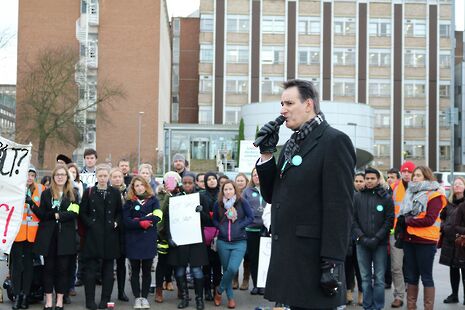‘This affects everybody’: Addenbrooke’s junior doctors strike
Patients, colleagues and trade unionists join junior doctors in strike rally

Up to 200 people attended a rally and three picket lines outside Addenbrooke’s Hospital on Tuesday in support of junior doctors striking over the government’s proposed new contract.
The rally, largely organised by the Cambridge community branch of trade union Unite, saw members of the public, trade unionists and medical professionals from other hospitals demonstrate alongside doctors taking part in the British Medical Association (BMA) strike.
One junior doctor, who did not wish to be named, said the new contract would mean doctors were “strained to the max” and said the government was on a “different planet”.
Another claimed the new contract would also disincentivise junior doctors working in research, who he claimed would now be “the weakest link in the chain”.
Around 200 junior doctors are believed to have taken part in the strike, with around 210 remaining at work to provide emergency care.
At 10 a.m., the rally’s scheduled start time, around 25 picketers were gathered at the main entrance to the emergency department, handing out BMA stickers and leaflets.
Though the picketers were largely greeted positively, with some entering the hospital heard saying “best of luck to you” and “good on you people”, the reaction was not unanimous.
One man entering the hospital was heard saying that “the five professions work seven days a week, and don’t go on strike over it”.
Hospital porters then moved the picketers from outside the emergency department entrance, saying their presence was “a bit intimidating” for patients.
Fewer than 20 operations are believed to have been cancelled at Addenbrooke’s as a result of the strike.
Charlie Bell, co-Chair of the BMA’s Medical Students Committee and a Cambridge medical student, was quick to dismiss criticism of the strike.
“Junior doctors work extraordinarily long hours for their patients,” he told Varsity. “It’s a deliberate lie to suggest otherwise.”
“This strike is about safety and fairness, to prevent doctors being overworked, and to ensure those who work outside normal working hours are properly recompensed.”
Picketers frequently cited safety and the way junior doctors were treated to explain their presence at the rally.
One oncology registrar told us: “Why would you work somewhere you feel unsafe?”
Another, a midwife protesting with her daughter-in-law, said: “This affects everybody. Eventually, everybody becomes a patient.”
During the main rally, a BMA representative said: “It’s great to see so many people, especially from the unions.”
She thanked the hospital trust for their support, including for the use of the car park for the rally.
James Youd, secretary of Cambridge Unite and one of the rally’s main organisers, said of the contents of the Health and Social Care Act 2012 and the proposed junior doctors’ contract: “I see it as the end of the NHS.”
Martin Booth, who previously stood as a parliamentary candidate in Cambridge for the Trade Union and Socialist Coalition and worked as an operating department practitioner in Addenbrooke’s during the 1980s, called the strike “the first really powerful action by any medical professionals”.
He accused the government of setting up NHS departments to fail for private companies “waiting in the wings.”
Daniel Zeichner, Labour MP for Cambridge, was due to speak at the event, but pulled out on Monday, citing parliamentary business in Westminster.
Councillor Dave Baigent read out a statement on his behalf, in which he called the dispute “unnecessary”.
“I know that none of you want to be taking this action,” the statement read. “It is because you care that you are protesting.
“The NHS will not be improved by attacking doctors.”
In November Heidi Allen, Tory MP for South Cambridgeshire, whose constituency includes the hospital, issued a public apology during a conference at its School of Clinical Medicine.
“I can’t speak for the government … I can only speak for how I feel, in the Conservative Party, that this has gone really badly wrong,” she said.
Speeches were closed by medical negligence lawyer Peter Stefanovic, who called the dispute with the government “an historic struggle … for every man, woman and child”.
“Who are we going to believe: 53,000 of our kindest, most loving professionals, or a health secretary who has proven he can’t be trusted?” he said.
He also accused the government of being “manifestly unjust”, claiming that blaming the BMA for the strike was “completely untrue and wholly misleading”.
Bell echoed his views.
“The government needs to listen to our concerns and come to the table with a desire to negotiate. Till now, they have been found wanting,” he said.
Health Secretary Jeremy Hunt said the strike was “completely unnecessary” and urged junior doctors to return to negotiations.
If no agreement is found, a 48-hour walkout will start on 26th January.
 Interviews / ‘People just walk away’: the sense of exclusion felt by foundation year students19 April 2024
Interviews / ‘People just walk away’: the sense of exclusion felt by foundation year students19 April 2024 News / Controversy on the Cam: John’s spend almost 90 times more on rowing than other colleges19 April 2024
News / Controversy on the Cam: John’s spend almost 90 times more on rowing than other colleges19 April 2024 Theatre / The closest Cambridge comes to a Drama degree 19 April 2024
Theatre / The closest Cambridge comes to a Drama degree 19 April 2024 News / Corpus student left with dirty water for over six months21 April 2024
News / Corpus student left with dirty water for over six months21 April 2024 News / Emmanuel College cuts ties with ‘race-realist’ fellow19 April 2024
News / Emmanuel College cuts ties with ‘race-realist’ fellow19 April 2024






